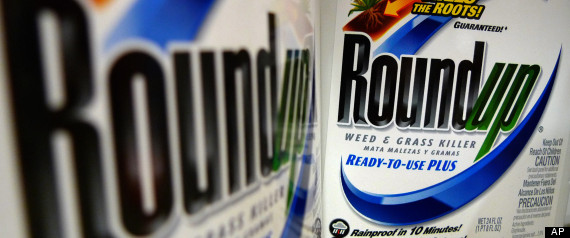March 20. 2015, – by Mary Ellen Kustin, Senior Policy Analyst, Environmental Working Group
 Glyphosate – the active herbicide in the widely used Monsanto’s Roundup and Dow Agrosciences Enlist Duo weedkillers – is “probably carcinogenic to humans,” a working group of scientists at the World Health Organization announced today.
Glyphosate – the active herbicide in the widely used Monsanto’s Roundup and Dow Agrosciences Enlist Duo weedkillers – is “probably carcinogenic to humans,” a working group of scientists at the World Health Organization announced today.
The explosion of glyphosate use in recent years has been driven primarily by the widespread adoption of GMO corn and soybeans. These GMO plants have been genetically engineered to withstand blasts of this powerful herbicide and kill the weeds around them. The use of glyphosate in the U.S. has increased by more 500 million pounds between 1996 and 2011.
According to an article in the Lancet, “[Glyphosate] use has increased sharply with the development of genetically modified glyphosate-resistant crop varieties. Glyphosate has been detected in air during spraying, in water, and in food.”
Scientists from 11 nations met at the International Agency for Research on Cancer, a branch of the World Health Organization, earlier this month to assess the likelihood that certain pesticides used in industrial agriculture would cause cancer.
They decided to classify glyphosate as a “probable carcinogen,” a conclusion that built on IARC’s conclusion last year that some evidence linked glyphosate to an increased risk of non-Hodgkin lymphoma, a type of blood cancer.
(Read more about last year’s study here: www.ewg.org/agmag/2014/05/study-glyphosate-doubles-risk-lymphoma.)
Because farmers have relied so heavily on glyphosate, many of them are now dealing with “superweeds” – varieties of weeds that no longer die when sprayed – and are turning to more toxic weed killers like 2,4-D. Dow’s Enlist Duo is a mixture of glyphosate and 2,4-D.
Given the increased use of herbicides associated with the production of GMOs, it’s no wonder more than 90 percent of consumers want to exercise their right to know if there are GMOs in their food.
Some members of Congress are fighting to deny you that right. They’ve introduced legislation, dubbed the Deny Americans the Right Know (DARK) Act by opponents, that would block state GMO labeling laws and restrict FDA’s ability to require national GMO labeling
Download PDF of Lancet Report : Lancet herbicide
